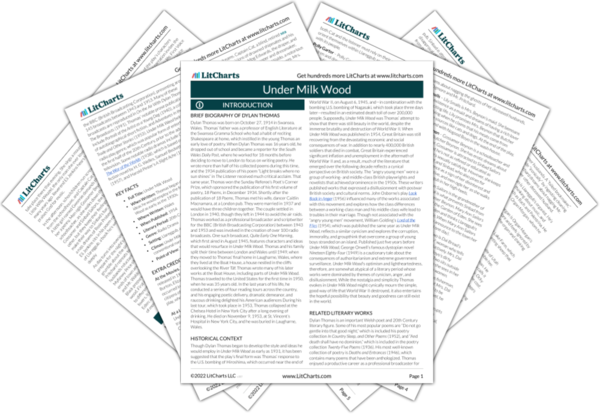In a small town like Llareggub, news travels fast, and everyone knows everyone else’s business. Women flock to Mrs. Organ Morgan’s general store or the town pump to trade bits of gossip. Before heading to work, Llareggub’s postman, Willy Nilly, and his wife, Mrs. Willy Nilly, steam open and read all the townspeople’s mail, and Willy Nilly passes along the information he gleans from their snooping to people he encounters on the street as he makes his deliveries. Captain Cat spends his days perched beside an open window, employing his acute sense of hearing to keep track of the day’s happenings, identifying the people who walk past him by the sound their feet make as they touch the cobblestoned streets. And most of the wives have an opinion on Polly Garter, a single mother who has affairs with many of their husbands. Yet there isn’t an inherent cruelty in Llareggub’s gossip. On the contrary, the rumors that make their way around town are lighthearted, humorous, and ultimately unite the townspeople in a shared experience of the ups and downs of life. Under Milk Wood depicts Llareggub as a thriving community of engaged citizens who benefit from their participation in the experience of public life.
Gossip and Community ThemeTracker

Gossip and Community Quotes in Under Milk Wood
Less than five hundred souls inhabit the three quaint streets and the few narrow by-lanes and scattered farmsteads that constitute this small, decaying watering-place which may, indeed, be called a ‘back-water of life’ without disrespect to its natives who possess, to this day, a salty individuality of their own. The main street, Coronation Street, consists, for the most part, of humble, two-storied houses many of which attempt to achieve some measure of gaiety by prinking themselves out in crude colours and by the liberal use of pinkwash, though there are remaining a few eighteenth-century houses of more pretension, if, on the whole, in a sad state of disrepair. Though there is little to attract the hillclimber, the healthseeker, the sportsman, or the weekending motorist, the contemplative may, if sufficiently attracted to spare it some leisurely hours, find, in its cobbled streets and its little fishing harbour, in its several curious customs, and in the conversation of its local ‘characters,’ some of that picturesque sense of the past so frequently lacking in towns and villages which have kept more abreast of the times.
Oh, isn’t life a terrible thing, thank God?
Up the street, in the Sailors Arms, Sinbad Sailors, grandson of Mary Ann Sailors, draws a pint in the sunlit bar. The ship’s clock in the bar says half past eleven. Half past eleven is opening time. The hands of the clock have stayed still at half past eleven for fifty years. It is always opening time in the Sailors Arms.
Can’t hear what the women are gabbing round the pump. Same as ever. Who’s having a baby, who blacked whose eye, seen Polly Garter giving her belly an airing, there should be a law, seen Mrs. Beynon's new mauve jumper, it’s her old grey jumper dyed, who’s dead, who’s dying, there’s a lovely day, oh the cost of soapflakes!
CAPTAIN CAT. That’s Polly Garter. (Softly) Hullo, Polly my love, can you hear the dumb goose–hiss of the wives as they huddle and peck or flounce at a waddle away? Who cuddled you when? Which of their gandering hubbies moaned in Milk Wood for your naughty mothering arms and body like a wardrobe, love? Scrub the floors of the Welfare Hall for the Mothers’ Union Social Dance, you’re one mother won't wriggle her roly poly bum or pat her fat little buttery feet in that wedding–ringed holy to–night though the waltzing breadwinners snatched from the cosy smoke of the Sailors Arms will grizzle and mope.
Praise the Lord! We are a musical nation.
MRS ORGAN MORGAN. And when you think of all those babies she’s got, then all I can say is she’d better give up bird nesting that’s all I can say, it isn’t the right kind of hobby at all for a woman that can’t say No even to midgets. Remember Bob Spit? He wasn’t any bigger than a baby and he gave her two. But they’re two nice boys, I will say that, Fred Spit and Arthur. Sometimes I like Fred best and sometimes I like Arthur. Who do you like best, Organ?
ORGAN MORGAN. Oh, Bach without any doubt. Bach every time for me.
MRS ORGAN MORGAN. Organ Morgan, you haven’t been listening to a word I said. It’s organ organ all the time with you…
FIRST VOICE. And she bursts into tears, and, in the middle of her salty howling, nimbly spears a small flatfish and pelicans it whole.
ORGAN MORGAN. And then Palestrina,
SECOND VOICE. says Organ Morgan.
We are not wholly bad or good
Who live our lives under Milk Wood,
And Thou, I know, wilt be the first
To see our best side, not our worst.
FIRST VOICE. […] And Mr. Waldo drunk in the dusky wood hugs his lovely Polly Garter under the eyes and rattling tongues of the neighbours and the birds, and he does not care. He smacks his live red lips. But it is not his name that Polly Garter whispers as she lies under the oak and loves him back. Six feet deep that name sings in the cold earth.
POLLY GARTER. (Sings)
But I always think as we tumble into bed
Of little Willy Wee who is dead, dead, dead.











